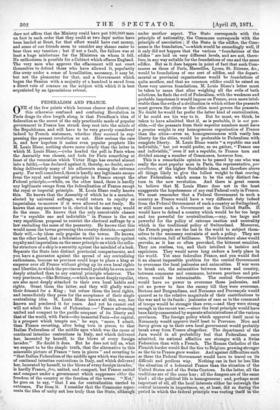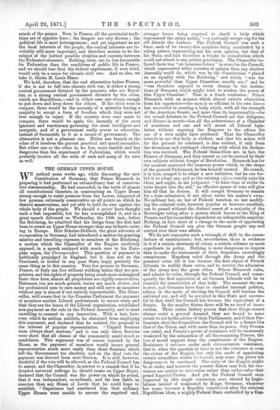FEDERALISM AND FRANCE.
ONE of the few points which become clearer and clearer, as this otherwise confused and confusing Revolution in Paris drags its slow length along, is that Proudhon's idea of federation as the secret of the only practicable mode of popular government in France has struck deep root into the minds of the Republicans, and will have to be very gravely considered indeed by French statesmen, whether they succeed in sup- pressing the present revolution or not. How serious the case is, and how hopeless it makes even popular prophets like M. Louis Blanc, nothing shows more clearly than the letter in which M. Louis Blanc,—(who headed the poll in Paris when the Assembly was chosen, and feels for Paris something at least of the veneration which Victor Hugo has erected almost into a faith),—has declared against it, thereby, no doubt, sacri- ficing deliberately many of his adherents among the extreme party. For well considered, there is hardly any legitimate escape • from the royal and imperial principle in France except the Federal principle,—while, on the other hand, there is hardly any legitimate escape from the federalization of France except the royal or imperial principle. M. Louis Blanc really knows this. He knows that the Assembly of which he is a member, elected by universal suffrage, would return to royalty or imperialism to-morrow if it were allowed to act freely. He knows that any successor to it, elected in the same 'ay, would do the same. He knows that the only conceivable chance for "a republic one and indivisible" in France is the not very republican proposal to restrict the electoral suffrage by a law excluding the mass of the peasantry. He knows that this would mean the towns governing the country districts,—against their will,—by ideas only popular in the towns. He knows, -on the other hand, that a federation would be a security against royalty and imperialism on the same principle on which the cellu- lar structure of a ship is a security against the mischief of a leak. Separate the State into distinct provincial compartments, and you have a guarantee against the spread of any centralizing enthusiasm, because no province could hope to place a king or emperor over all France without giving up its own local rights and liberties, to which the provinces would probably be even more deeply attached than to any central principle whatever. The very provinces,—like Brittany,—which are most deeply royalist, are also most deeply attached to their own local habits and rights. Grant them the latter, and they will gladly waive their demand for a King ; but refuse them the local rights, and immediately they press for the acceptance of their single centralizing idea. M. Louis Blanc knows all this, nay, has known and pondered it for years. And yet he cannot and will not admit the idea of Federation :—" France advancing united and compact to the pacific conquest of its liberty and that of the world, with Paris—the immortal Paris—for capital, is a prospect which tempts me," he says, "more, I admit, than France reverting, after being torn in pieces, to that Italian Federalism of the middle ages which was the cause of continual intestine contentions in Italy, and which delivered her, lacerated by herself, to the blows of every foreign invader." No doubt it does. But he does not tell us, what we suspect to be the simple truth, that the alternative to this miserable picture of France "torn in pieces" and reverting to "that Italian Federalism of the middle ages which was the cause of continual intestine contentions in Italy, and which delivered her, lacerated by herself, to the blows of every foreign invader," is hardly France, free, united, and compact, but France united and compact under a government which suppresses either the freedom of the country or the freedom of the towns. "Not," he goes on to say, "that I am for centralization carried to extremes, Far from it. I consider that the Commune repre- sents the idea of unity not less truly than the State, although under another aspect. The State corresponds with the principle of nationality, the Commune corresponds with the principle of association ; if the State is the edifice, the Com- mune is the foundation,"—which would be exceedingly well, if it only did not happen that the various "foundations of the edifice" are laid on very different levels, and are not, there- fore, in any way suitable for the foundations of one and the same edifice. Bat as it does happen in point of fact that such Com- munes as those of Paris, Marseilles, Lyons, St. Etienne, &c., would be foundations of one sort of edifice, and the depart- mental or provincial organizations would be foundations of quite another, and that no common edifice could be raised on these very uneven foundations, M. Louis Blanc's letter must be taken to mean that after weighing all the evils of both solutions, he finds the evil of Federalism, with the weakness and probable impotence it would impose on France, even more intol- erable than the evils of a civilization in which either the peasants must govern the cities or the cities must govern the peasants. No doubt he would far prefer the latter kind of centralization, if he could see his way to it. But he must, we think, be taken to have admitted that if, as is probable, it is not pos- sible,—if the peasants from their superior numbers must have a greater weight in any homogeneous organization of France than the cities—even so, homogeneousness with vastly less liberty for the cities, would be preferable to Federalism with complete liberty. M. Louis Blanc wants "a republic one and indivisible," but yet would prefer, as we gather, "France one and indivisible," even if not a republic, to France torn and divided among a number of Communes, however free.
This is a remarkable opinion to be passed by one who was really the most popular man in Paris, the representative, par excellence, of the higher Socialistic ideas, and therefore above all things likely to give the fullest weight to that craving after Federalism which seems to be the only distinct fea- ture in the new revolution. And there is great reason to believe that M. Louis Blanc does not in the least exaggerate the hopelessness of any real Federal unity in France. We must remember that a Federal Government in such a country as France would have a very different duty indeed from the Federal Government of such a country as Switzerland, or still more such a Government as the United States. It would have to defend a country which would be far too large and too powerful for neutralization,—nay, too large and powerful for the policy of extreme caution and neutrality which is the traditional policy of Switzerland. Moreover, the French people are the last in the world to subject them- selves to the necessary restraints of such a policy. They are vain, vivacious, full of brilliance. Their literature alone would provoke, as it has so often provoked, the bitterest enmities. They are restless, too, and their intellect is incisive and capricious. They would never long endure a lowly place in the world. Yet once federalize France, and you would find it an almost impossible problem for the central Government to overcome the local jealousies and animosities. If war were to break out, the animosities between towns and country, between commune and commune, between province and pro- vince, would be interminable. The central Government would have no power to overcome these jealousies, and yet no power to face the enemy till they were overcome. Bretons and Burgundians, and Normans and Provencals would quarrel as to the relative magnitude of their contributions to the war and to its funds ; jealousies of race as to the command of troops would be stronger than ever,—and they were strong enough in the recent war,—since the local principle would have been fairly consecrated by separate administrations of the various provinces. The foreign policy which approved itself most to Normandy would approve itself least to Provence. Nice and Savoy given up to their own local government would probably break away from France altogether. The department of the Jura would in all probability feel that Federalism once admitted, its national affinities are stronger with a Swiss Federation than with a French. The Roman Catholics of the Flemish border would find the ties to Belgium growing stronger as the tie to France grew weaker. And against difficulties such as these the Federal Government would have to travel on its difficult and perilous way. Nothing can in fact be less like the situation of a federated France than the situation of the United States and of the Swiss Cantons. lathe latter, all the traditions are of the same hue ; all the dangers are of the same kind ; all the political life is homogeneous ; and, perhaps most important of all, all the local interests either far outweigh the central interests in importance, or, at least, did so during the period in which the federal principle was rooting itself in the minds of the people. Now, in France, all the provincial tradi- tions are of opposite hues ; the dangers are very diverse ; the political life is most heterogeneous ; and yet important as are the local interests of the people, the central interests are in- evitably still more important, and therefore certain to be the subject of the hottest possible rivalries and contests between the Federated elements. Nothing, then, can be less favourable for Federation than the conditions of public life in France, and we should fear that the federal experiment, if ever tried, would only be a name for chronic civil war. And so also, we take it, thinks M. Louis Blanc.
We hold, therefore, that the real alternative before France, if she is not to fall into chronic civil war, is either a strong central government dictated by the peasants, who are Royal- ists, or a strong central government dictated by the cities, which are Republican,—and in either case ope strong enough to put down and keep down the others. If the cities were to conquer, there would be the anomaly of a minority forcing a majority to accept a form. of freedom which they were not free enough to reject. If the country were once more to conquer, there would be again the anomaly of the most ignorant and reactionary governing the most intelligent and energetic, and of a government really averse to education, instead of favourable to it as a means of government. The alternative is not a pleasant one. Either one branch or the other of it involves the gravest practical and moral anomalies. But either one or the other is, we fear, more feasible and less dangerous than the experiment of Federalism, which would probably involve all the evils of each and many of its own as well.



































 Previous page
Previous page